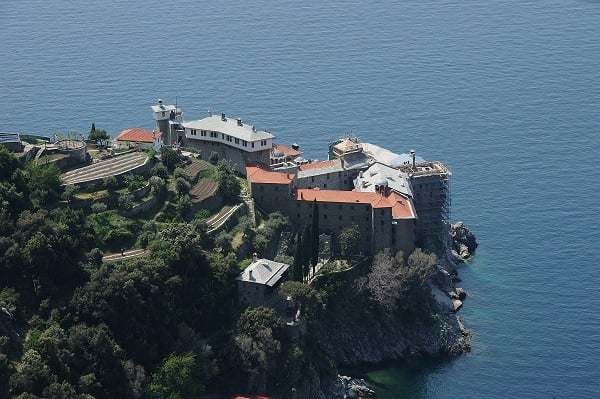‘Athos Ithaca’, a Poem for Orthodox Christian Monasticism
28 March 2016[Previous Publication: http://pemptousia.com/2016/03/on-fr-moyses-poem-athos-ithaca/]
‘Athos Ithaca’ is a poem closely related to monasticism and its Christian character is revealed through the importance of monasticism in Orthodoxy. Monasticism is a mystery, in which a person leaves modern society in order to join the monastic community. Although a monk leaves modern world, he loves life and society.[110] Also, he has to be devoted to ascesis.[111] He should seek the real freedom far from any passions. The only way to gain this freedom is through ascesis, which is the fight against human desires, and obedience, which helps monk to fight selfishness.[112] The target of monasticism is love for God and people.[113]
By saying to the young monk that he did not reach the end of his journey in the poem, Fr Moyses alludes to ascesis. He advises the young monk that he should be focused on a continual ascesis in order to gain the real freedom and fulfil the goal of monasticism which is love. We meet God, only if we are wholly devoted to Him.[114] A monk can come close to God, when ascesis becomes his main duty.[115]
Ascesis should be accompanied by vigil and prayer. According to Fr Moyses’ words in Vigil on Mount Athos, vigil constitutes prominent work for monks. God comes in the middle of the night and talks to monk. This is a beneficial moment for monks.[116] Also, in this book, Fr Moyses asserts that prayer is communication with God and fulfilment of His will. A monk should ignore everything and focus on prayer.[117] This is what Fr Moyses means in the poem, by telling the young monk to be patient. His arrival on Mount Athos is just the beginning of his monastic life. He has to draw his attention to ascesis.
In Orthodox Monasticism, Fr Moyses asserts that monasticism is strictly associated with Orthodoxy and it is the perfect fulfilment of the gospels. Ascesis plays significant role in a monk’s life and presupposes self-control, fasting, standing and ordeals.[118] Ascesis in tranquillity, in combination with prayer, directs monk to holiness.[119] It means the elimination of any fleshly desires which are works of devil. Ascesis destroys demonic traps, fleshly desires and avarice.[120] A monk joins the monastic community in order to be a member of a new, better dwelling. In this community, he has to be obedient.[121]
In Orthodox Monasticism, Fr Moyses also writes that ascesis has no end. It constitutes the route to theosis (deification).[122] These words are reminiscent of his advice to the young monk, that his arrival on Mount Athos is just the beginning of his new life. Thus, in ‘Athos Ithaca’, Fr Moyses exhorts the young monk to ascesis in order to reach theosis. And this is another basic element which gives Fr Moyses’ poem Christian character.
[To Be Continued]
[110] Αρχιμανδρίτου Χριστόδουλου Κουτλουμουσιανού, Η Παρουσία του Μοναχού στον Σύγχρονο Κόσμο (Mount Athos, 2011), 7, 12.
[111] Χριστόδουλου Κουτλουμουσιανού, Η Παρουσία του Μοναχού, 12.
[112] Χριστόδουλου Κουτλουμουσιανού, Η Παρουσία του Μοναχού, 18.
[113] Χριστόδουλου Κουτλουμουσιανού, Η Παρουσία του Μοναχού, 21.
[114] Μωυσέως Αγιορείτου, Αγρυπνία στο Άγιον Όρος, 62.
[115] Μωυσέως Αγιορείτου, Αγρυπνία στο Άγιον Όρος, 62.
[116] Μωυσέως Αγιορείτου, Αγρυπνία στο Άγιον Όρος, 64.
[117] Μωυσέως Αγιορείτου, Αγρυπνία στο Άγιον Όρος, 59.
[118] Μωυσέως Αγιορείτου, Ορθόδοξος Μοναχισμός, 53, 78.
[119] Μωυσέως Αγιορείτου, Ορθόδοξος Μοναχισμός, 78.
[120] Μωυσέως Αγιορείτου, Ορθόδοξος Μοναχισμός, 81.
[121] Μωυσέως Αγιορείτου, Ορθόδοξος Μοναχισμός, 81.
[122] Μωυσέως Αγιορείτου, Ορθόδοξος Μοναχισμός, 82.







